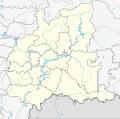Top Qs
Timeline
Chat
Perspective
Federal districts of Russia
Federal subjects of Russia From Wikipedia, the free encyclopedia
Remove ads
The federal districts (Russian: федеральные округа, IPA: [fʲɪdʲɪˈralʲnɨjɪ ɐkrʊˈɡa]) are groupings of the federal subjects of Russia. Federal districts consist of a group of regions with various autonomy levels as per constitution, but the districts themselves are not mentioned by the constitution and are not autonomous, do not have administrative competences of their own, and do not manage regional affairs. They exist solely to monitor consistency between the federal and regional bodies of law, and ensure federal management of the civil service, judiciary, and federal agencies operating in the regions.[1] The federal district system was established on 13 May 2000.

Remove ads
List of federal districts
Summarize
Perspective
Source:[8]
- Includes the Republic of Crimea and Sevastopol, annexed by Russia in 2014, as well as Donetsk, Kherson, Luhansk, and Zaporizhia oblasts annexed in 2022; recognized as parts of Ukraine by most of the international community.
Remove ads
History
The federal districts of Russia were established by a decree issued by President Vladimir Putin on 13 May 2000 to facilitate the federal government's control of the then 89 federal subjects across the country.[9][10]
On 19 January 2010, the new North Caucasian Federal District split from the Southern Federal District.[8]
In March 2014, after the annexation of Crimea, the Crimean Federal District was established.[11] The legality of this annexation is disputed by an overwhelming majority of countries.[12] On 28 July 2016 the Crimean Federal District was abolished and merged into the Southern Federal District in order to improve governance.[13]
In November 2018, Buryatia and Zabaykalsky Krai were moved from the Siberian Federal District to the Far Eastern Federal District in accordance with a decree issued by Putin.[14] The Administrative Centre of the Far Eastern Federal District relocated from Khabarovsk to Vladivostok in December 2018.[15]
Remove ads
Presidential plenipotentiary envoys
- Central Federal District
- Igor Shchyogolev (since 26 June 2018)[16]
- Southern Federal District
- Vladimir Ustinov (since 12 May 2008)
- Northwestern Federal District
- Aleksandr Gutsan (since 7 November 2018)[17]
- Far Eastern Federal District
- Yury Trutnev (since 31 August 2013)[18]
- Siberian Federal District
- Anatoly Seryshev (since 12 October 2021)[19]
- Ural Federal District
- Vladimir Yakushev (since 9 November 2020)
- Volga Federal District
- Igor Komarov (since 7 September 2018)
- North Caucasian Federal District
- Yury Chaika (since 22 January 2020)[16]
See also
- Economic regions of Russia, a similar grouping of federal subjects, for economic and statistical purposes
- List of countries and dependencies by area
- Military districts of Russia, a similar grouping of federal subjects, for military purposes
- Zonal Councils of India, similar entities
References
External links
Wikiwand - on
Seamless Wikipedia browsing. On steroids.
Remove ads








